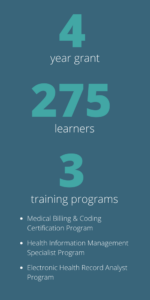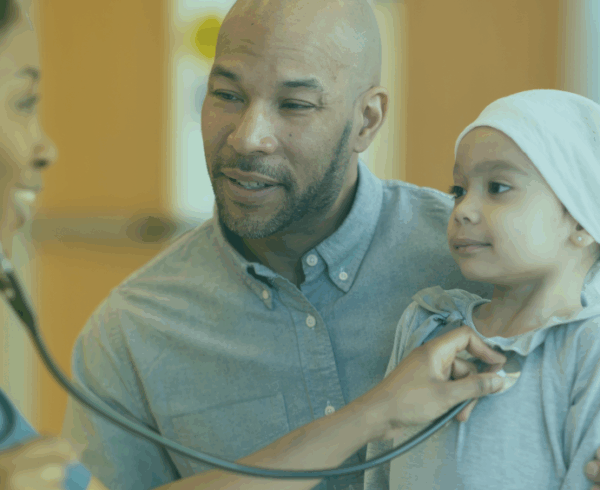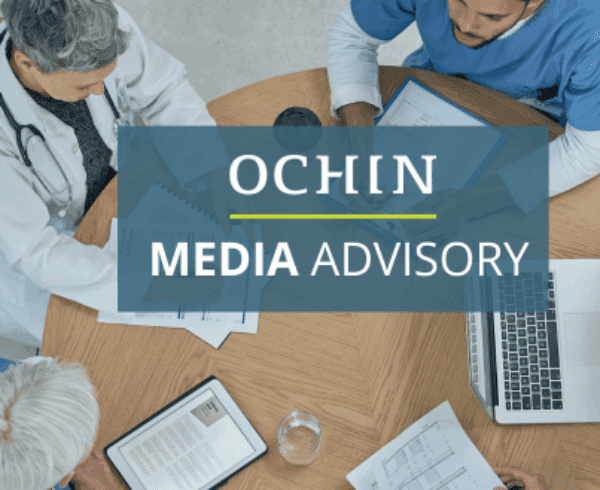March 21, 2023
OCHIN was awarded a $15 million grant to support a new workforce development partnership in California that will help rebuild and strengthen the health care workforce through job training and placement. This program will help meet the needs of health centers in rural and medically underserved communities while creating meaningful career paths that expand economic opportunity for residents statewide.
“Through this innovative partnership in California, OCHIN and HCAI are addressing common workforce challenges while attracting, training, and placing new talent in meaningful, family-sustaining jobs that also help expand access to care for the wider community,” said Abby Sears, CEO and president of OCHIN.
The four-year grant is funded by the state of California and managed by the California Department of Health Care Access and Information (HCAI). Through the partnership, OCHIN will train 275 learners in one of three health information technology (HIT) fields: medical billing and coding, health information management, and electronic health record analysis. Participants will receive stipends to reduce economic barriers to training, and the program will assist with job placement following successful completion.
Uncovering gaps in care
 A recent OCHIN network analysis revealed that members are experiencing a shortage of operational staff, which hinders health centers’ ability to function efficiently, affects patient access to care, decreases financial stability, and contributes to provider burnout. According to OCHIN Epic satisfaction surveys, more than one in three providers report feeling burned out, in part due to the increase in administrative and operational duties.
A recent OCHIN network analysis revealed that members are experiencing a shortage of operational staff, which hinders health centers’ ability to function efficiently, affects patient access to care, decreases financial stability, and contributes to provider burnout. According to OCHIN Epic satisfaction surveys, more than one in three providers report feeling burned out, in part due to the increase in administrative and operational duties.
Meanwhile, a network analysis of 2018-2021 member data revealed that patient encounters at OCHIN member clinics in California began rising in 2021. While this follows a decline in 2020, the analysis suggested that the 2020 decline created a significantly increased patient need in 2021 even as clinic staffing dwindled.
Based on these insights and the direct input and experiences of nearly 50 OCHIN Epic members in California, OCHIN recognized that the current workforce is not sufficient to meet the growing demand for community care in California. In response, OCHIN leveraged its experience with workforce development and offered integrated solutions to help the state address staffing shortages and improve access to comprehensive patient care by training a skilled workforce to step into key roles.
The new program was made possible with the generous support of two visionary champions in the California legislature: State Assembly Members Phillip Chen and Evan Low.
Building the workforce of the future
The new partnership in California is part of the growing portfolio of learning and workforce development programs led by OCHIN, which is now supported by more than $20 million in grant investments. Training will be administered by OCHIN’s learning and workforce development portfolio, OCHIN+, which launched last year to build clinical capacity and increase opportunity in the health care industry. OCHIN+ currently supports a Health Resources and Services Administration (HRSA) funded community health workers training program, a Public Health AmeriCorps program, and a growing suite of online trainings and certifications.
Access to affordable and timely care is critical to improving both individual and population health outcomes. Partnerships, such as the new HCAI program and the others supported by OCHIN+, help improve access to whole-patient care while fortifying a depleted health care workforce with freshly skilled and ready-to-hire talent.
OCHIN and HCAI will partner with OCHIN network members, other California health center networks, and the Health Resources and Services Administration (HRSA) to recruit participants. For more information or to apply, visit the OCHIN+ website.
We acknowledge that this program is made possible through the coordination of and funding from the California Department of Health Care Access and Information (HCAI).














Leave a Comment